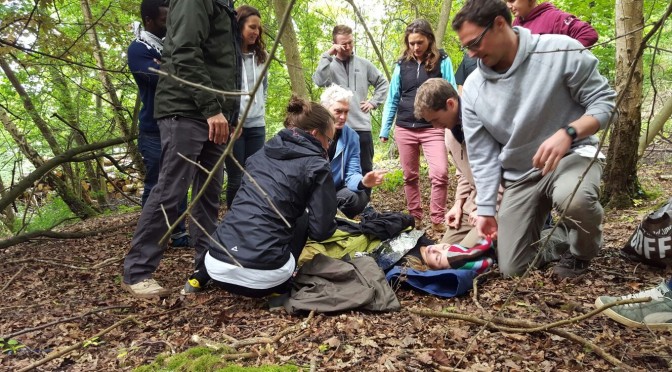So first aid training save lives, everyone agrees about that surely. But is all first aid training good first aid training? In the UK a change in the way workplace first aid training is regulated has lead to a wider range of training providers offering courses. Accessibility to courses is generally a good thing, but people should be aware of the variety of courses that are now on offer.
Many first aid courses are geared towards passing the end of course test, but they should be aimed at making the delegates confident to apply their skills, in a realistic setting and scenario. Elsewhere we have written about the time and effort that we spend on our casualty simulation and scenarios, we’re not alone in this [I hope], but many courses don’t include any exposure to “real” casualty treatment.
The experience of treating an injured or ill person for the first time is well- unique, challenging, frightening, exhilarating- these are all words that our team themselves have used. But does a classroom first aid course, with a multiple choice test paper at the end prepare you for the “plunge” into this? It can be argued that no training puts you under the same pressures as that first “call/incident”, but it is possible to get 90-95% of the way in training.
Training needs to be structured in such a way, that it moves the delegates towards a level of unconscious competence, ie doing stuff without thinking about it. Most people attending first aid training begin at the level of unconscious incompetence [not knowing what they don’t know] or conscious incompetence [knowing they don’t know stuff]. Only by repeated, practical, immersive training can we realistically hope to improve on this.
The use of carefully planned scenarios, supported by a high level of casualty simulation and “scene setting”, being run by experienced trainers and actors should be a central part of all first aid/medical training.
The emergency services and armed forces have applied this to their training increasingly in recent years, but it is possible to apply this to any first aid course longer than a few hours. It just takes some work! Perhaps this is were the difference in training providers will become apparent, a general training company which has included first aid training in its portfolio will struggle to deliver to the same intensity and depth as a purely medical training company.
After all, first aid training can save lives, but it takes good first aid training to prepare you to do it for real.

